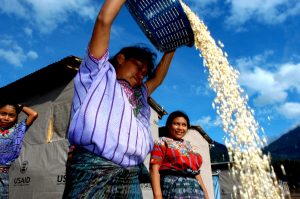One of IFPRI’s earliest nutrition projects in Latin America and the Caribbean examined food-assisted maternal and child health and nutrition programs in Haiti. Traditionally, these programs administered nutritional interventions to children under five years of age only after they became undernourished—the recuperative approach. Although new scientific evidence was surfacing that children under two years of age were more responsive to nutritional interventions, evidence was still lacking that this preventive approach would work in large-scale programs. From 2002 to 2006, IFPRI collaborated with Cornell University, the United States Agency for International Development (USAID), and World Vision in Haiti to compare the two approaches. The study, Prevention or Cure? Comparing Preventive and Recuperative Approaches to Targeting Maternal and Child Health and Nutrition Programs in Rural Haiti, revealed that children who received the preventive approach experienced less stunting and wasting. The compelling results contributed to global acceptance of this new approach to combating child undernutrition. In fact, all organizations that were part of the 2008 USAID Title II Program adopted the preventive approach as recommended by the study. The evaluation also encouraged World Vision to modify their programs in Central America and Ethiopia, adopting the new approach.
In Guatemala in 2004, IFPRI, in partnership with the US National Institutes of Health and the National Science Foundation, conducted a groundbreaking evaluation of the long-term impact of early childhood nutritional interventions. Data were collected on adults who had been enrolled in a nutritional intervention study from 1969 to 1977, which randomly assigned nutritious and less-nutritious supplements in two villages. The paper, Effect of a Nutrition Intervention during Early Childhood on Economic Productivity in Guatemalan Adults, showed that exposure to nutritious supplements before the age of two substantially improved the welfare of children when they became adults, increasing men’s wages by 46 percent and raising the educational completion level of women by one to two grades. This was the first direct evidence that investments in preschool nutrition yield high returns in adulthood and can contribute to economic growth. This study influenced the Copenhagen Consensus to urge decision makers to prioritize nutritional interventions for children. Several agencies and organizations drew from this evaluation in forging their nutrition strategies, including the World Bank’s Repositioning Nutrition as Central to Development, UNICEF’s Ending Child Hunger and Undernutrition Initiative, and the UK Department for International Development’s (DFID) nutrition strategy. Together with the findings in Haiti, this study in Guatemala helped convince the global nutrition community, including the Scaling Up Nutrition Movement, to adopt a child’s first 1,000 days as the critical window of opportunity for improving nutrition. In addition, findings from IFPRI’s nutrition work in LAC underpinned the development of the IFPRI-led CGIAR Research Program on Agriculture for Nutrition and Health’s (A4NH) strategy and work.
With robust evidence supporting the importance of nutrition, the Government of Guatemala launched the Zero Hunger Pact (Pacto Hambre Cero) in 2010 with a mission to significantly reduce chronic malnutrition in children under five by 2015. IFPRI worked with Guatemala’s Secretaría de Seguridad Alimentaria y Nutricional (SESAN), Instituto Nacional de Estadística (INE), and Ministerio de Finanzas Públicas (MINFIN) to evaluate the program, present recommendations for improvements, and provide technical assistance and trainings on research methods and policy analysis. From 2010 to 2014, the Government of Guatemala and its partners reduced chronic malnutrition in children under five by 2 percent. The strong emphasis on sound research during this collaboration promoted a culture of evaluation and accountability in Guatemala’s nutrition policy sector. As a result, the Zero Hunger Pact adopted a rigorous and regular monitoring and evaluation system called SIMON—a tool for monitoring public expenditures and tangible goals. Moreover, the government that took office in 2016 is implementing a new program that draws on IFPRI’s recommendations: ensuring that each child is given a full intervention package, prioritizing areas with high malnutrition rates, changing the focus from the number of interventions to the number of beneficiaries, incorporating mobile phone delivery of interventions, and strengthening the delivery infrastructure.
For more information on IFPRI's research and partnerships in Latin America and the Caribbean, please go to this brochure.



